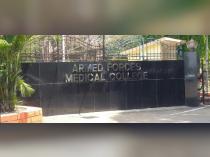How may I take admission in AFMC for BMRIT course? Is NEET score important for it or can I take admission through CUET also?
Asked about Armed Forces Medical College - Bachelor of Radiographic Technician (BMRIT)
My class 12th score is 84%, CUET score is 517 and NEET marks are 300.
-
1 Answer
-
Yes, you need to qualify for the National Eligibility cum Entrance Test (NEET) to get admission to the Bachelor of Radiographic Technician (BMRIT) course at Armed Forces Medical College (AFMC).
Selection criteria
NEET: Candidates must score well in the NEET exam.
AFMC Screening Process: This includes a written test, interview, and medical examination.
Academic Criteria: Candidates must meet the academic criteria for the course. For example, for the MBBS course, candidates need to have at least 60% aggregate marks in Physics, Chemistry, Biology, and English in class 12.
Application process
Apply for the NEET exam.
...more
Similar Questions for you
The SOA University NEET UG Cutoff 2025 was published for admission to the MBBS course for all rounds and various categories under the All India quota. The overall cutoff for the General AI category students ranged from 233205 to 298163, according to the first and last round cutoff ranks.
Note: The cutoff for other categories in different rounds will vary accordingly.
No, appearing in the NEET exam is not a mandatory eligibility requirement to appear for the MH BSc Nursing exam. Candidates can appear for this entrance after completing Class 12th to seek admission to government nursing colleges in the state.
Yes, it is mandatory to appear for the ToGIGE even if the candidates have appeared for the NEET exam. The ToGIGE is a part of the selection process post the NEET exam. Those aspirants who clear the NEET cutoff are only eligible to appear for this test.
Jackpot Fund 𝒍𝒐𝒂𝒏 app customer 𝒄𝒂𝒓𝒆 Number √° 86530-78173™™₹₹₹ Jackpot Fund 𝒍𝒐𝒂𝒏 app customer 𝒄𝒂𝒓𝒆 Number √° 86530-78173™™₹₹₹ Jackpot Fund 𝒍𝒐𝒂𝒏 app customer 𝒄𝒂𝒓𝒆 Number √° 86530-78173™™₹₹₹ Jackpot Fund 𝒍𝒐𝒂𝒏 app customer 𝒄𝒂𝒓𝒆 Number √° 86530-78173™™₹₹₹
Taking an Exam? Selecting a College?
Get authentic answers from experts, students and alumni that you won't find anywhere else
Sign Up on ShikshaOn Shiksha, get access to
- 66k Colleges
- 1.2k Exams
- 681k Reviews
- 1800k Answers

